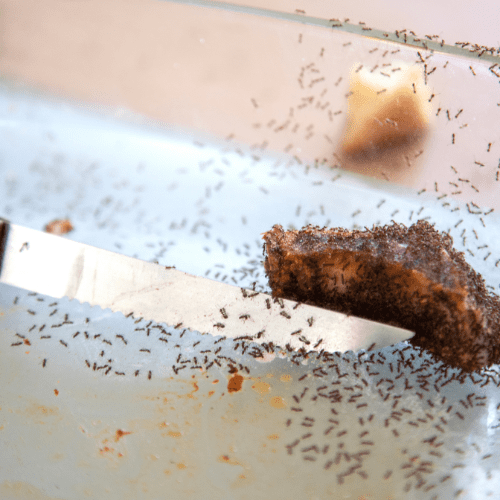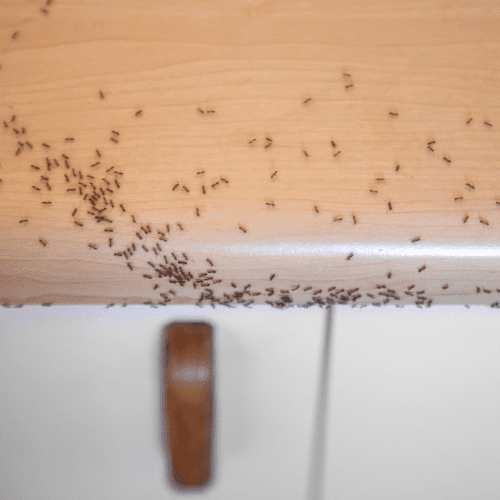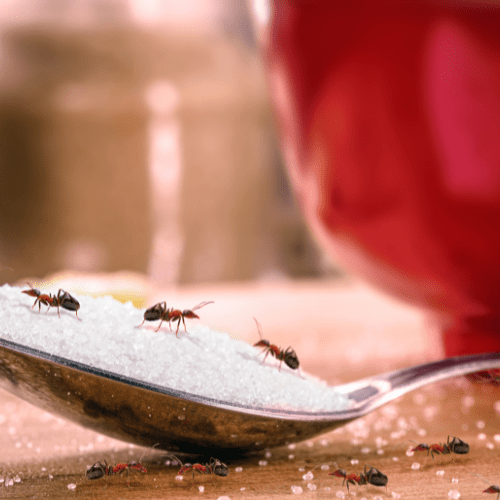


The kitchen is the heart of the home, and it should be a welcoming place for family and friends, not ants. Despite our best efforts, these persistent little insects have a way of making their presence known, especially where food is involved. Ant infestations in the kitchen can quickly go from a minor annoyance to a full-blown problem, interrupting the cleanliness and harmony of your space. Preventing ants from taking over your kitchen requires proactive measures—identifying entry points, maintaining cleanliness, and applying deterrent methods.
An ant-free kitchen is not only more pleasant, but it is also crucial for your health and well-being. Ensuring that food is stored properly and that crumbs and spills are addressed promptly can go a long way toward keeping ants at bay. Meanwhile, understanding the different methods for controlling ants—both natural and chemical—allows homeowners to make informed decisions based on their preferences and the severity of the issue. Developing preventative practices for long-term control will ensure your kitchen remains a no-ant zone, maintaining the comfort and cleanliness of your home.
Key Takeaways
- Maintaining cleanliness and proper food storage is essential in ant prevention.
- Knowledge of ant control methods allows for effective management of infestations.
- Long-term ant control practices safeguard the kitchen from future invasions.
Preventing an ant infestation begins with recognizing how these persistent insects gain access to your kitchen. Specifically, homeowners should focus on sealing any cracks and ensuring window and door frames are properly maintained.
Seal Cracks and Crevices
Inspect the kitchen walls and baseboards for any cracks and crevices that may serve as ant entry points. It is crucial to use a quality caulk to seal these gaps effectively. Even the smallest opening can provide ants with a gateway into your home, so attention to detail is important.
Window and Door Maintenance
Regular checks of window frames and door sills can reveal unnoticed spaces where ants may enter. Ensure that all window frames are intact, and replace any worn-out weather stripping around doors. Using weather-resistant caulk to fill gaps on window sills and along the siding can seal entry points that might otherwise be overlooked.
Maintaining a Clean and Ant-Free Kitchen
To ensure a kitchen remains ant-free, focus on meticulous food storage, consistent cleaning routines, and control of moisture sources. These proactive steps discourage ant infestations by removing attractants.
Proper Food Storage
Storing food properly is critical in preventing ants. All food should be kept in sealed containers, especially sweets, which attract ants the most. For example, fruit must be refrigerated or covered in airtight containers to minimize its allure to ants. Similarly, pet food should be stored in sturdy containers with tight-fitting lids to prevent it from becoming a food source for ants.
Regular Cleaning Habits
One of the most effective ways to maintain an ant-free kitchen is establishing regular cleaning habits. Immediately wiping down countertops to remove crumbs and spills is essential, as even small food particles can entice ants. It’s equally important to wash dishes promptly, never leaving them in the sink overnight. Floors should be swept daily, and a mixture of water and dish soap can help erase pheromone trails left by scout ants.
Addressing Moisture and Water Sources
Ants are drawn to areas with excessive moisture. Checking for and repairing leaks near sinks, refrigerators, and other appliances is necessary. Ensuring that the kitchen sink is dry after use and that the trash can is routinely emptied and cleaned can greatly reduce a kitchen’s appeal to ants. Removing standing water sources eliminates essential water sources for ants, further safeguarding the kitchen from an invasion.
Natural and Chemical Ant Control Methods
To effectively keep ants away from your kitchen, you may choose from a variety of natural remedies and chemical solutions. These options range from simple DIY methods to professional pest control services, each with unique benefits and considerations.
Natural Repellents and Deterrents
- Vinegar: A solution of equal parts water and vinegar can act as an ant deterrent. Spray this mixture around entry points.
- Peppermint Oil: Ants are repulsed by peppermint. A few drops on a cotton ball placed strategically can keep them at bay.
- Cinnamon: Ground cinnamon or cinnamon oil can serve as a barrier due to its strong scent.
- Borax: Mixing borax with sugar creates a homemade ant bait. The sugar attracts ants, while the borax is toxic to them.
- Diatomaceous Earth: This powder can be sprinkled in areas where ants travel, working as a non-toxic insecticide.
Choosing and Applying Ant Baits
- Commercial Ant Baits: Available at stores, they often contain boric acid or other chemicals that lure and poison ants.
- DIY Baits: Combining sweeteners with borax or boric acid can serve as an effective homemade ant bait.
- EPA Guidelines: When choosing ant baits, it’s essential to select products registered with EPA for safety and effectiveness.
- Application: Place baits near ant trails or colonies, away from children and pets.
Professional Pest Control and Insecticides
- Non-Repellent Insecticides: These can control ant infestations without them being aware of the chemical, ensuring ants carry the insecticide back to the nest.
- Pest Control Service: Sometimes, a professional pest control service is the best option to identify and eradicate severe infestations.
- Safety: Ensure any professional service you employ follows strict safety protocols, particularly if they use non-repellent insecticides.
Using a combination of these natural and chemical methods can help to keep your kitchen ant-free. For safety and effectiveness, follow product instructions or consult professionals when necessary.
Preventative Practices for Long-Term Ant Control
Effective ant prevention in the home hinges on diligence and creating environments that discourage ant colonization. Homeowners can curb ant infestations by regular upkeep and employing strategies that disrupt the desirable conditions ants seek for survival.
Regular Inspections and Maintenance
Regular inspections play a critical role in long-term ant control. It is vital to check for leaks and seal entry points where ants could gain access to the kitchen. By promptly addressing these issues, homeowners remove critical resources that ants need to thrive. Moreover, professional pest control services can contribute significantly to these efforts through thorough inspections and maintenance advice.
Creating an Unwelcoming Environment for Ants
To make the kitchen less inviting to ants, the utilization of airtight containers for food storage is key. It is essential to keep counters free of crumbs and spills that attract ants. Employ natural deterrents like vinegar or citrus sprays to disrupt pheromone trails. For sustained ant management, homeowners can consider strategic placement of bait stations designed to target the whole colony, not just foraging ants. Should a sudden ant infestation occur, do not hesitate to call a professional as they ensure customer service tailored to effectively treat the ant colony and advise on prevention strategies. Remember, eliminating moisture and securing your yard can also deter ants from establishing a presence in your home.
Frequently Asked Questions
In this section, readers will find guidance on natural methods, home remedies, and sustainable practices to keep ants at bay in their kitchens.
What is the most effective natural method for keeping ants out of the kitchen?
One highly effective natural method for ant prevention is the use of vinegar, which disrupts their scent trails, deterring them from entering the kitchen.
Which home remedies are recommended for preventing ants from invading the kitchen?
Home remedies like sprinkling cinnamon, lemon juice, or peppermint near entry points are widely recommended for their repelling properties against ants.
What is the fastest way to eliminate an ant infestation in the kitchen?
For a swift solution to an ant infestation, using bait stations can quickly attract and poison the ants, reducing the population rapidly.
Are there any long-term solutions for repelling ants from the kitchen?
Maintaining a clean kitchen, routinely sealing cracks, and using barrier sprays provide long-term defenses against future ant intrusions.
How can baking soda be used to deter ants in the kitchen area?
Baking soda, when mixed with powdered sugar, can act as a homemade bait; ants are attracted to the sugar and are harmed by the baking soda ingestion.
What scents or substances are known to effectively repel ants?
Certain scents like those from essential oils of clove, eucalyptus, or citrus are known to effectively repel ants due to their strong odors.
Why Call STL Pest Control for Ant Infestations
When it comes to dealing with persistent ant infestations in your kitchen, professional help can make all the difference. STL Pest Control, based in St. Louis, offers expert pest management services tailored to your needs. Here’s why you should choose STL Pest Control:
- Expertise and Experience: With years of experience in the pest control industry, our team understands the behavior and biology of ants, allowing us to implement effective and targeted solutions.
- Comprehensive Inspections: We conduct thorough inspections to identify entry points, nests, and attractants, ensuring that we address the root cause of the infestation.
- Customized Treatment Plans: Our services are customized to fit your specific situation, whether you prefer natural remedies or need advanced chemical treatments.
- Safe and Effective Solutions: We prioritize the safety of your family and pets, using EPA-approved products and following strict safety protocols.
- Preventative Measures: Beyond extermination, we provide guidance on preventative practices to keep your kitchen ant-free in the long term.
- Customer Satisfaction: Our commitment to excellent customer service means we won’t rest until your home is pest-free. We offer follow-up visits and advice to ensure lasting results.
Don’t let ants disrupt the comfort and cleanliness of your kitchen. Contact STL Pest Control in St. Louis for professional, reliable, and effective ant control services.

